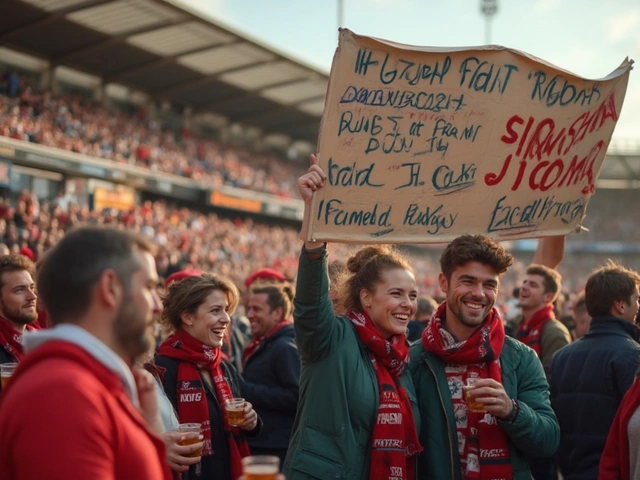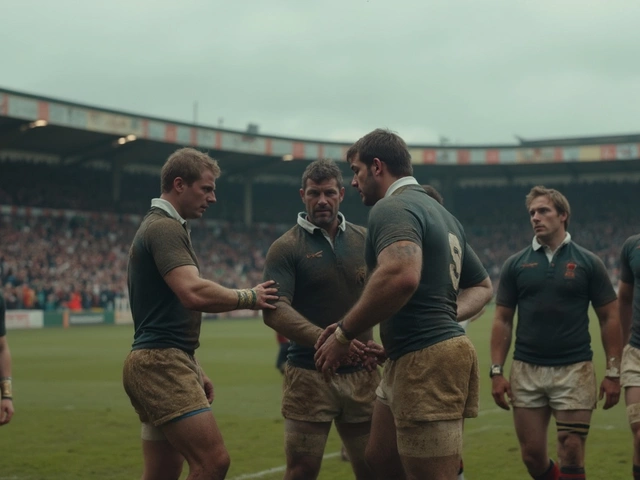Rugby Fixtures: Why Does a Match Go Over 80 Minutes?
If you’ve ever found yourself impatiently checking the clock during a tense rugby match, you’re not alone. Pretty much everyone expects the final whistle to blow at 80 minutes—so why does the action keep on going?
The first thing to know: the clock on your screen or in the stadium isn’t the whole story. Referees have the final say, and they don’t stop play just because the digital display hits 80. Play keeps going until the ball, in most cases, goes dead. This isn’t just some old-timey tradition either; it’s built into how rugby works, making every match unpredictable right to the end.
- What '80 Minutes' Really Means
- How Time Is Kept in Rugby
- Stoppages: The Hidden Minutes
- When Can a Rugby Match Go Beyond 80?
- Famous Moments That Went Past 80
- Tips for Watching the Final Minutes
What '80 Minutes' Really Means
Ask any rugby fan—most folks will tell you a match lasts 80 minutes. But in reality, that's only part of the story. Every rugby fixture is split into two halves of 40 minutes each. But those numbers are just the bones. What matters is how the time is actually managed on the field.
The clock in rugby counts up from zero to 40, then resets for the second half. It only hits 80 once the second half ends. But this doesn’t always match up with when the whistle actually goes. Here’s why: the referee keeps control of stoppages—injuries, substitutions, and reviews all pause the game, but not always the main stadium clock. So, there’s often a gap between the official match time and what the crowd sees on the clock overhead.
Unlike football (soccer), rugby doesn’t rely on "added time" announced at the end. When the stadium clock strikes 80:00, play continues until the ball goes dead, meaning it’s out of bounds or a score is made. This gives the high-stakes drama you often see in tight games. You’ll notice commentators talking about teams "running down the clock" or “playing for time”—that’s only possible because those final moments count for so much.
Here’s a quick look at how standard match time lines up with reality:
| Rugby Level | Half Length (mins) | Expected Total Time (mins) | Average Time to Final Whistle (mins) |
|---|---|---|---|
| Professional | 40 | 80 | 82-86 |
| Amateur/Social | 35 | 70 | 72-75 |
So, the next time you’re checking the game clock, remember: the "rugby fixtures" tradition is less about the numbers on the scoreboard and more about when the ref finally calls it. That last play after the 80 can decide everything—and sometimes it does.
How Time Is Kept in Rugby
Most folks figure a rugby game is like football—when the clock hits zero, it’s done. But rugby has its own twist. A standard match lasts 80 minutes, split into two 40-minute halves. What trips people up is that the clock doesn’t always tell the full story, especially when it comes to rugby fixtures.
Time isn’t kept by a single stadium clock everyone can see. The official match time is actually in the hands of the referee, with help from a timekeeper in pro games (like in the English Premiership or World Cup). If you’ve ever heard the phrase, “time off,” that’s the referee pausing the clock for injuries, substitutions, TMO reviews, or anything else that brings play to a halt. When everything’s set, the ref signals “time on” and play resumes.
Here’s how the timing typically works in a top-level game:
- Referee controls the official match time with a watch.
- Time stops for injuries, checks, substitutions, or scuffles.
- When the clock hits 40 (half) or 80 (full time), play only ends after the ball goes dead (out of play, try scored, or penalty awarded).
You’ll often see clocks in the stadium and on TV screens, but those are more for show. In fact, they sometimes keep running when the referee has actually stopped the official clock. That’s why matches can spill over into 82, 83, or even more minutes.
To make things clearer, here’s a quick look at what can cause stoppages and affect the length of a game:
| Reason for Stop | Typical Pause (seconds) |
|---|---|
| Injury Treatment | 30–120 |
| Video Review (TMO) | 60–180 |
| Substitution | 30–60 |
| Penalty Marking | 10–30 |
Bottom line: the clock is pretty loose, and that’s on purpose. Referees don’t want to rob teams of a fair shot at their last play, so the final minutes always keep you guessing.
Stoppages: The Hidden Minutes
Every rugby fan has seen the clock hit 80:00, but the match drags on—sometimes by several heart-pounding minutes. That’s because stoppages are baked into how the game runs, and these pauses stop the official game clock. The most common reasons? Injuries, scrums collapsing, lineouts taking forever to set, and even simple equipment fixes like a broken bootlace.
The referee doesn’t actually pause the clock himself. Instead, pro matches use a stadium timekeeper who handles all the starts and stops using signals from the referee. When you spot the ref making a 'T' sign with his hands, he’s calling for time off, and the clock freezes right then. These little gaps add up fast, often adding anywhere from 5 to 10 minutes—or even more in wild matches—onto the official 80 minutes.
"Stoppage time often catches people off guard, especially new spectators. Play only ends when the referee decides—and that’s after the ball goes dead following 80 minutes," says Nigel Owens, one of rugby’s most respected referees.
To get a sense of how much extra time stoppages bring, check out this overview of one 2023 Rugby World Cup quarter-final:
| Type of Stoppage | Number | Total Minutes Added |
|---|---|---|
| Injury breaks | 7 | 4.5 |
| Scrum resets | 6 | 3 |
| Lineout delays | 3 | 1.5 |
| Other | 2 | 1 |
If you’re watching rugby fixtures live, try timing the breaks yourself—you’ll see how those minutes add up. And remember, stoppage time isn’t posted up on a board like in soccer, so the end really is a guessing game until the ref finally blows for full time.

When Can a Rugby Match Go Beyond 80?
The short answer? Way more often than most sports fans expect. In rugby, just because the clock says 80:00 doesn’t mean you’re done. The ref waits for the ball to become dead—meaning it’s out of play—before blowing that final whistle. So if there’s ongoing play, a penalty, or a scoring opportunity, things can stretch well past the magic number.
Here’s how it usually works. If a team gets a penalty or a scrum right before the clock hits 80, they still get the chance to play it out. You’ll notice this most during tight games, where every second counts. Teams try to keep the ball alive as long as possible, especially if they’re chasing points or hanging on to a win. That’s why you see so many nail-biting finishes, sometimes lasting two, three, or even five minutes over time.
- If the game stops for injuries, TMO (video referee) reviews, or other breaks, all that time is added back in as stoppage time.
- If the ref awards a penalty before the clock hits 80, the team has every right to take it—even if it means a whole new sequence starts.
- Play usually only ends when the ball is kicked out (for touch), a try is scored, or the attacking team commits an infringement that gives the ball back to the other side.
It’s a rule that makes sense when you consider how rugby’s flow works. The clock sticks to 40 minutes a half, but stoppages mean the actual played time can be less—so those extra minutes help make up for lost action.
| Year | Notable Game Overtime | Reason |
|---|---|---|
| 2015 | Japan vs South Africa (RWC) | Japan scored a match-winning try at 83:29 |
| 2021 | France vs Wales (Six Nations) | France played until 81:56 to score last-gasp try |
| 2019 | England vs Scotland (Six Nations) | Final play stretched into 84th minute |
If you’re new to watching, don’t panic when you see the numbers tick past 80. These last minutes are where some of the wildest rugby fixtures moments are born. And for die-hard fans, it’s a reason to never leave your seat early.
The rugby fixtures drama doesn't stop with the clock—it's all about what happens before the ref finally signals the end.
Famous Moments That Went Past 80
Some of the most nail-biting finishes in rugby history happened after that magic 80-minute mark. The drama isn’t just for show—the rules give teams a shot right up until the ball is dead, and this is when legends are made. Let's get real about a few of them.
Probably the most talked-about is the 2003 Rugby World Cup Final. England and Australia were tied 17-17 at full time. With the clock showing 82:20, Jonny Wilkinson slotted over the winning drop goal. It’s replayed a million times, and for good reason—it shows exactly how rugby match duration can change history.
Another game that fans still argue about is the 2015 Six Nations match between Wales and Scotland. The ball stayed alive for almost two extra minutes, with Scotland desperately trying to steal a win. Wales held on, but nobody sat down until that last whistle blew at nearly 83 minutes.
Leicester Tigers fans will remember the 2001 Heineken Cup Final when the clock went past 80, and Leon Lloyd scored the try that sealed the win over Stade Français. That late effort swung the whole tournament and the celebrations lasted even longer than the game.
| Match | Date | Outcome After 80 Min | Final Event Time |
|---|---|---|---|
| England vs Australia (World Cup Final) | Nov 22, 2003 | Wilkinson Drop Goal | 82:20 |
| Wales vs Scotland (Six Nations) | Feb 15, 2015 | Late Try Contention | ~83:00 |
| Leicester Tigers vs Stade Français (Heineken Cup Final) | May 19, 2001 | Winning Try by Lloyd | 80+ |
So if you ever wonder why fans don’t leave early, this is it. Games can completely flip after the clock goes red. Hold onto your snacks and maybe grab a cushion—because in rugby, it’s not over till it’s over.
Tips for Watching the Final Minutes
The last minutes of a rugby match are where things often get wild and unpredictable. If you're at the stadium or on the couch, there are a few smart ways to follow what’s really happening when the clock goes past those famous 80 minutes.
- Stay Alert, Not Just for the Clock: The one thing that really matters in rugby fixtures is not just the time on the scoreboard, but what the referee decides. The ball has to go out of play—so keep your eyes on the action, not just the numbers.
- Know What ‘Ball Dead’ Means: Play only stops for real when the ball goes out, a try is scored, or the referee blows for full-time. If a team’s pushing for a game-winner, expect extra phases as they hang onto every run and pass.
- Listen for the Referee’s Whistle: All the pressure can cause tense moments, but the referee controls when it’s really over. One long whistle and everyone can finally catch their breath.
- Look for Tactical Play: Teams sometimes go for broke in the dying moments—quick tap penalties, endless pick-and-gos, or booting the ball dead if they’re ahead. These are signs something big might happen.
- Understand Time Regulations: If there’s a scrum or a lineout awarded right on the 80-minute mark, play continues. The 2019 Rugby World Cup saw several crunch matches stretch on well after 80 minutes because of breakdowns and last-gasp attacks.
Check out this simple breakdown of how often the action runs past 80 minutes in top-tier tournaments:
| Tournament | 2019 Matches Going Past 80 Minutes | Average Overtime (minutes:seconds) |
|---|---|---|
| Six Nations | 12/15 | 2:18 |
| Rugby World Cup | 37/48 | 2:42 |
| Super Rugby | 83/120 | 3:06 |
So next time you’re watching a close match, don’t start celebrating at exactly 80 minutes. That last pass or tackle could decide the whole game.









